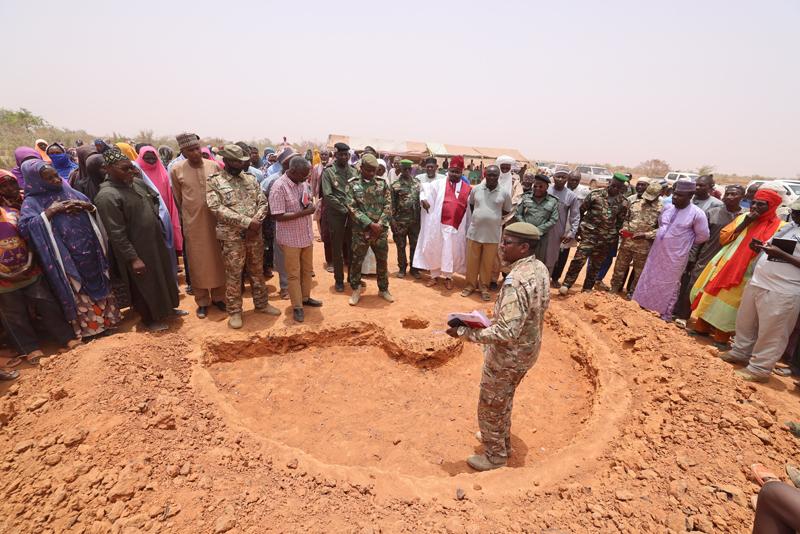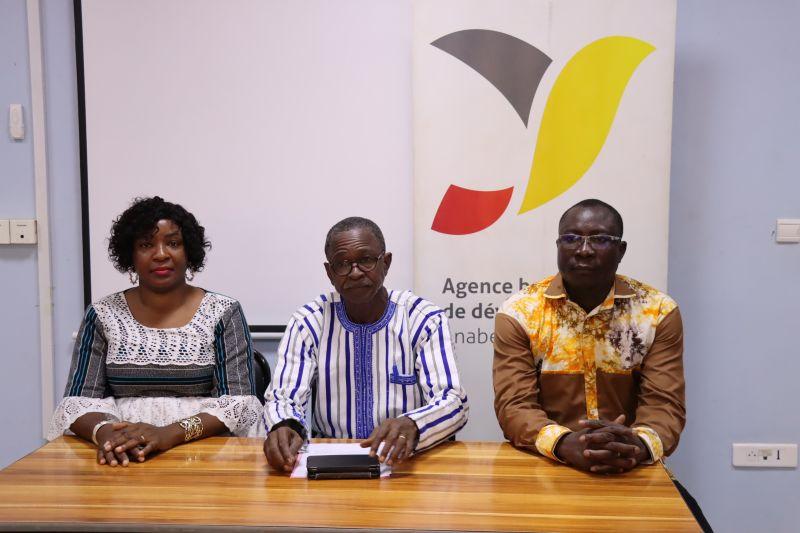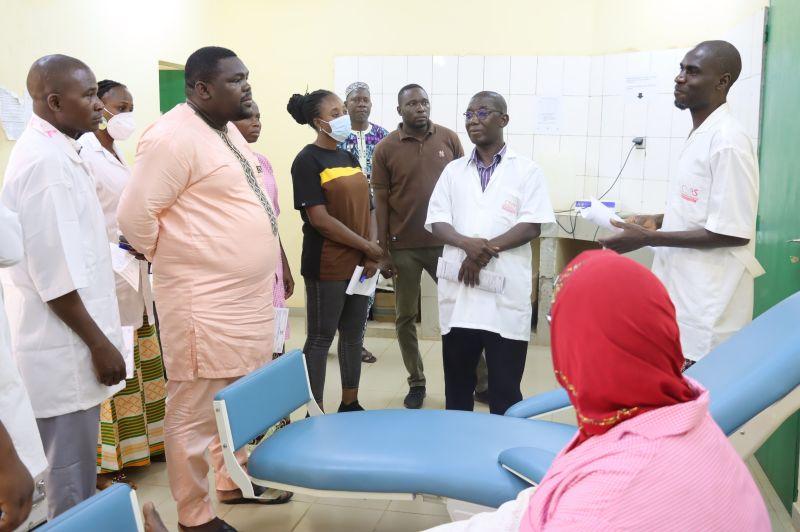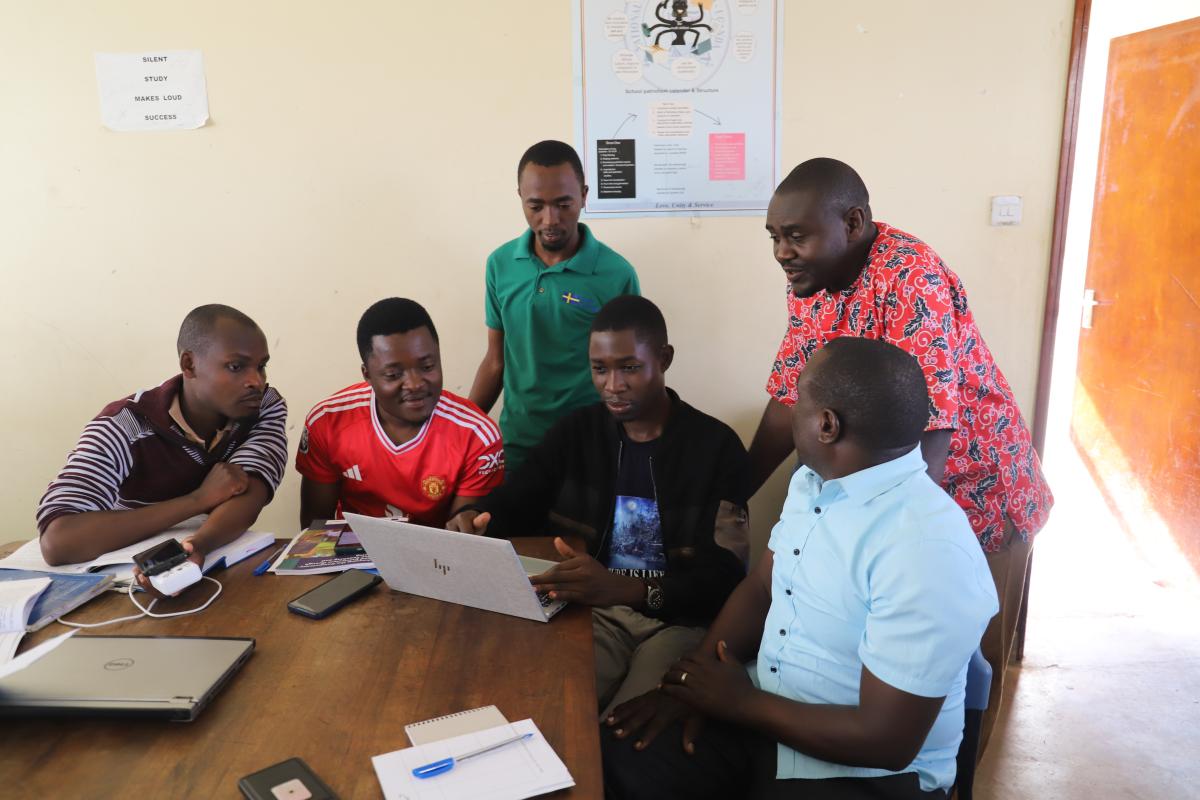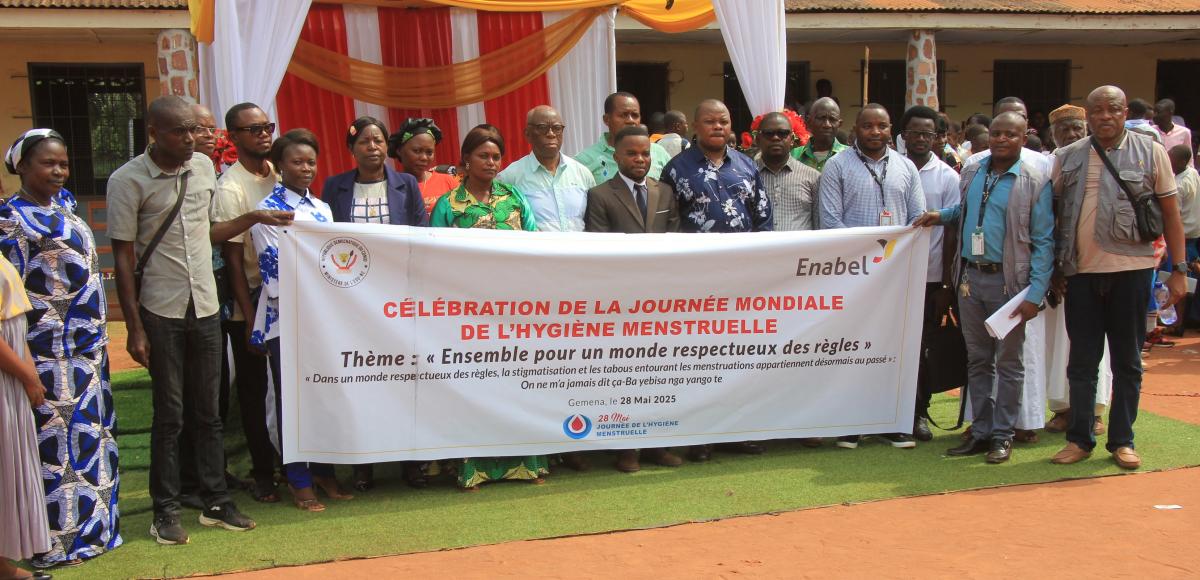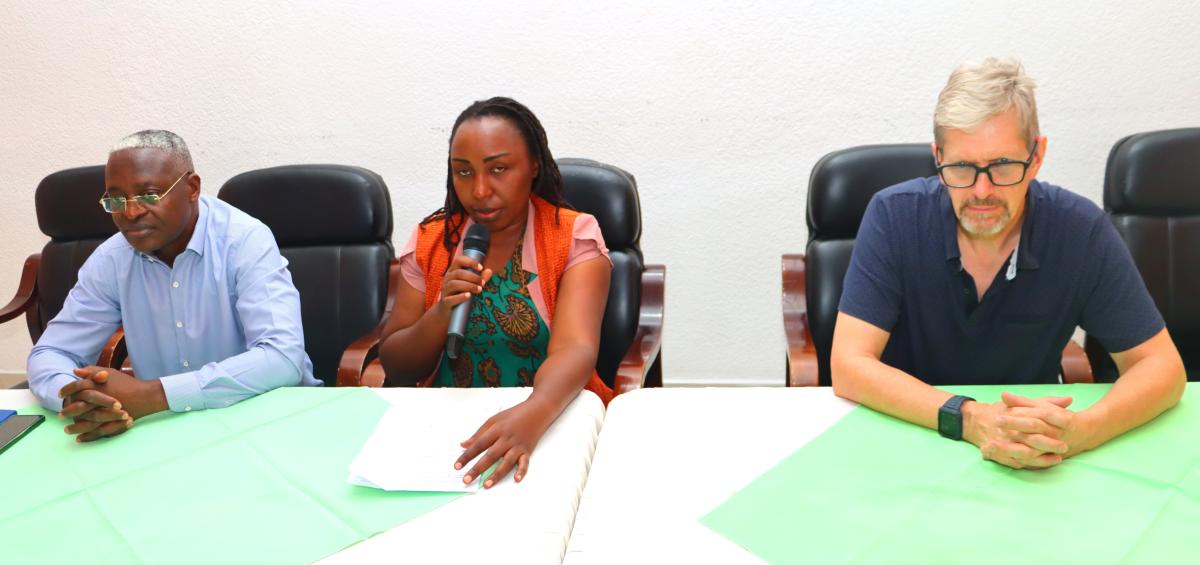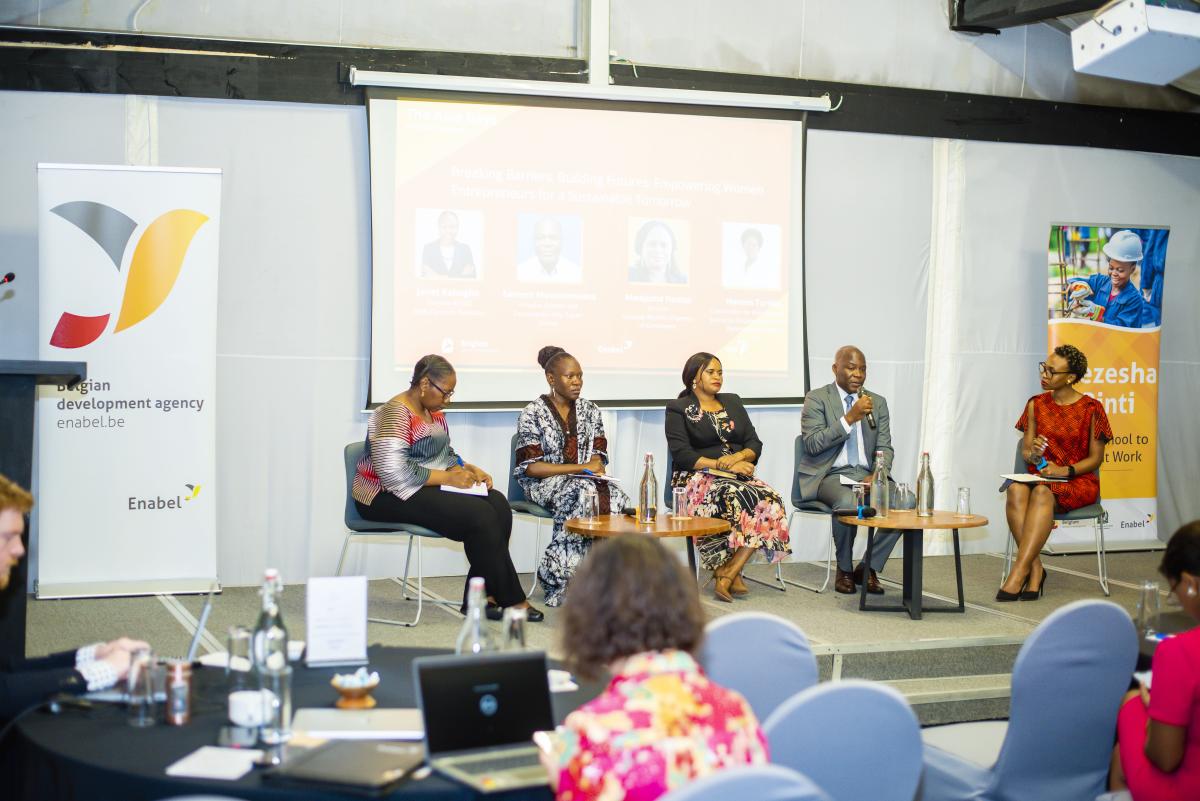Search
Viewing 330 to 345 of 3126 news
-
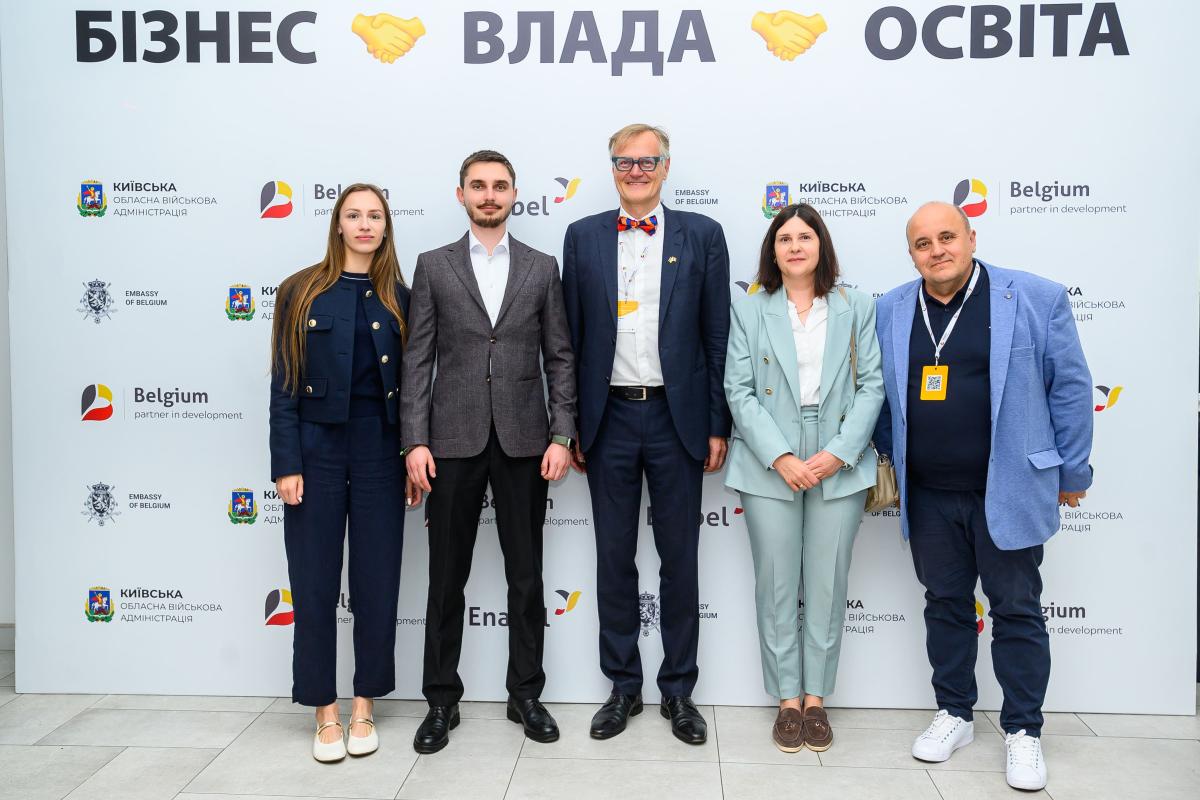
Ukraine: Enabel supports a human capital forum in Bucha
Taisiia DRUZIUK | 18/06/2025
On June 12 2025, a regional forum took place in Bucha, organised by the Kyiv Regional State Administration with support from Enabel and in partnership with the Embassy of Belgium in Kyiv.The "Regional Development Strategy: Synergy of Business, Government, and Education" event served as a platform for dialogue on economic recovery and development in the Kyiv region. Speakers who shared their vision for trilateral cooperation included Head of the Kyiv Regional State Administration Mykola Kalashnyk, Ambassador of Belgium to Ukraine Luc Jacobs, Deputy Minister of Education and Science Dmytro Zavgorodnii, Chairman of the Verkhovna Rada Committee on Education, Science and Innovation Serhii Babak, and Head of the State Tax Service Ruslan Kravchenko. Educational institution leaders presented practical cases of collaboration with the private sector, and business representatives offered their perspectives on human capital development. Enabel Country Director Dirk Deprez and expert Oleksandra Borodiyenko shared how the agency pilots innovations in vocational education and facilitates public-private partnerships between Ukrainian and European organisations. At the forum, Enabel and Bosch Ukraine signed a memorandum to establish the Bosch Junior Academy. This joint project will help VET trainers and students develop practical skills with modern automotive diagnostic equipment and gain hands-on experience in auto mechanics. Support for the event was made possible throught Enabel’s BE-Relieve Ukraine programme. The programme encompasses reconstruction and modernisation of schools, study visits to Belgium for Ukrainian educators and officials, and professional development programmes in partnership with industry-leading businesses.
-
Niger : restauration des terres dégradées dans les régions de Tahoua et Dosso
Halissa HASSAN DAN AZOUMI | 18/06/2025
Dans le cadre du Portefeuille Thématique Climat pour le Sahel – Volet Niger (PTCS-N), financé par le Royaume de Belgique et mis en œuvre par l’Agence de coopération internationale (Enabel) , une campagne de restauration de terres sylvopastorales a été officiellement lancé le 6 mai 2025 dans les régions de Tahoua et Dosso. Cette année 2025, ce sont 400 hectares de terres dégradées qui seront restaurés dans les communes de Matankari, Konni et Sokorbé, dont 100 hectares à travers une méthode innovante appelée HIMO pastorale, mise en œuvre sur le site de Bajada. Les 300 hectares restants seront traités par des techniques biomécaniques sur les sites de Bagagi, Folakam et Baziga.La cérémonie officielle de lancement s’est tenue à Bagagi, sous la présidence du Préfet de Dogondoutchi, en présence des autorités locales, des services techniques de l’environnement et de l’élevage, des chefs traditionnels et des populations bénéficiaires. Elle a été marquée par des discours, la remise symbolique des sites aux prestataires et une mobilisation importante des communautés. Ce programme de restauration a pour objectif de lutter contre la désertification, améliorer les terres de pâturage, créer de l’emploi local et renforcer la résilience des populations face aux effets du changement climatiqueEntre 2023 et 2024, plus de 2 500 hectares ont déjà été restaurés dans la zone d’intervention du projet, avec plus de 500 hectares dans la seule commune de Matankari. À travers cette initiative, Enabel et ses partenaires réaffirment leur engagement pour une gestion durable des terres au bénéfice des communautés sahéliennes.
-
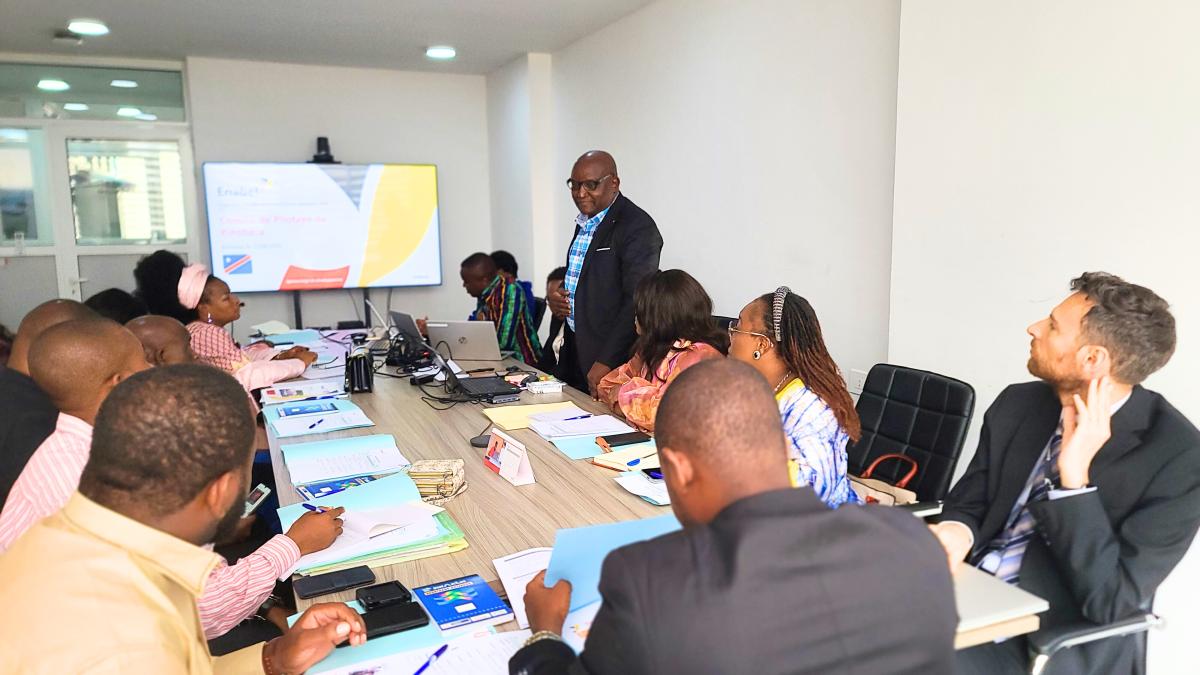
Clôture officielle du PLVS: L'ultime chapitre d'un engagement pour un avenir sans violences en RDC
Mandy BAKINE NGASHUE | 16/06/2025
Le Comité de pilotage du Programme de Lutte contre les Violences Sexuelles (PLVS) s’est réuni pour une séance de clôture marquant la fin du programme à Kinshasa. Cette réunion a permis de présenter et valider le rapport narratif final ainsi que le bilan financier du programme. Elle a également été l’occasion de formaliser le transfert des équipements et matériels aux partenaires concernés, et de décharger l’équipe de gestion du projet et le Comité de pilotage de leurs responsabilités et obligations. Présidée par le Ministère provincial de la Santé, de l’Hygiène et de la Prévention, la séance a adopté plusieurs recommandations clés visant à pérenniser les acquis du programme, notamment en lien avec la prise en charge médicale et juridiques des victimes et survivantes, la prévention des VBG en milieu scolaire, et bien d'autres. Après la présentation et la validation des différents rapports, suivies d’une série de questions d’éclairage, le Directeur de cabinet, Dr Balako, représentant du Ministre provincial de la Santé, de l’Hygiène et de la Prévention, a officiellement déclaré la fin de l’engagement entre Enabel et ses partenaires. Kinshasa étant la dernière zone d’intervention à clôturer le PLVS, ce désengagement marque ainsi la clôture définitive du programme. Face à la partie congolaise, la partie belge était représentée par son Directeur Pays Adjoint, Damien Fontaine. Le PLVS, mis en œuvre depuis 2016 dans le cadre de la coopération bilatérale entre la RDC et la Belgique, a œuvré dans les provinces de la Tshopo, du Sud-Ubangi, de Kinshasa et du Kasaï Oriental pour lutter contre les violences sexuelles à travers la prévention des VBG, la prise en charge holistique des victimes et la lutte contre l’impunité. ________________________________________Doudou Kajangu, Chargé C4D.
-
Burkina Faso : Session d'information sur la prévention et la gestion durables des conflits
Geoffroy ZONGO | 16/06/2025
Enabel renforce les capacités des observatoires communautaires dans le Centre-Est Durant le mois de mai 2025, à Tenkodogo, Enabel, l'Agence belge de coopération internationale en partenariat avec le Secrétariat permanent de l'Observatoire national de prévention et de gestion des conflits communautaires (ONAPREGECC), a organisé une session de formation à l'endroit des membres de trois membres du Centre-Est. Cette activité entre dans le cadre du Programme Gouvernance Locale et Cohésion Sociale, mis en œuvre par Enabel, qui vise à renforcer les capacités locales pour une paix durable. Font partie de cette session : l'Observatoire régional du Centre-Est (OREPREGECC), l'Observatoire provincial du Boulgou (OPEPREGECC), et l'Observatoire départemental de Tenkodogo (ODEPREGECC). Répartis dans trois salles différentes, les participants ont bénéficié du même contenu pédagogique, délivré par des formateurs distincts, afin de s'adapter aux réalités des différents niveaux de gouvernance. Environ 15 personnes par salle ont suivi un programme complet centré sur les mécanismes de prévention, d'analyse et de résolution des conflits communautaires. Les formateurs ont adopté une approche participative et interactive, favorisant des échanges d'expériences, des travaux de groupe et des mises en situation concrètes. Parmi les modules dispensés, figuraient : Présentation de l'ONAPREGECC : missions, composition et fonctionnement ; Dynamique et diversité des conflits communautaires ; Techniques de prévention des conflits communautaires ; Techniques d'analyse des conflits communautaires ; Techniques de résolution des conflits communautaires ; Stratégies de mobilisation des ressources endogènes, en vue d'assurer la mise en œuvre des Plans d'actions et le bon fonctionnement des démembrements ; Canevas de collecte des données. Pour Mme Koritimi WANGRE, Secrétaire permanente de l'ONAPREGECC, cette activité vise à rendre les démembrements réellement fonctionnels : « Chaque membre, qu'il soit régional, provincial ou départemental, doit être en mesure de jouer pleinement son rôle dans la prévention des crises qui appartiennent au tissu social. » Un participant, Boukari ZAPSONRE , membre de l'ODEPREGECC/Tenkodogo, a salué la pertinence de la formation : « Nous avons désormais les outils pour analyser les conflits en profondeur et proposer des solutions durables et consensuelles. »Cette session, financée par Enabel dans le cadre du Portefeuille de Coopération bilatérale belgo-burkinabè 2023-2027, illustre une volonté de renforcer les capacités locales et de créer des synergies durables entre les structures régionales, provinciales et départementales. À travers cet appui, Enabel contribue à la consolidation de la paix, à la cohésion sociale et à la gouvernance communautaire au Burkina Faso. La même dynamique se poursuivra dans les mois à venir dans d'autres localités du Centre-Est et du Centre-Nord, toujours avec l'ambition de construire des communautés résilientes et solidaires.
-
Burkina Faso : Des professionnels de santé formés pour améliorer les pratiques transfusionnelles
Geoffroy ZONGO | 16/06/2025
Dans le cadre de son soutien continu au système de santé burkinabè, Enabel, l’Agence belge de coopération internationale, a financé une série d’ateliers de renforcement des capacités sur les bonnes pratiques transfusionnelles. Coordonnés par le Centre régional de transfusion sanguine (CRTS) de Tenkodogo, les ateliers ont permis de former 85 professionnels de santé, dont 60 prescripteurs et 25 techniciens biomédicaux, issus des Centres médicaux avec antenne chirurgicale (CMA) et Centres médicaux (CM) de Koupéla, Pouytenga et Tenkodogo. Déployés en deux sessions, du 6 au 9 mai et du 20 au 23 mai 2025, ces atelires s’inscrivent dans le cadre du Programme de coopération bilatérale 2023-2027 entre la Belgique et le Burkina Faso, qui œuvre à la réduction de la mortalité maternelle, néonatale et infantile.Face aux insuffisances observées dans les pratiques transfusionnelles notamment les prescriptions abusives, le non-respect des règles, ou encore la gestion hasardeuse des incidents cette initiative vise à renforcer les compétences du personnel médical et paramédical pour une meilleure sécurité des patients, en particulier les femmes enceintes et les enfants de moins de cinq ans.Pendant quatre jours, les participants ont alterné entre des modules théoriques et des immersions pratiques au sein des services de collecte, de préparation et de distribution des produits sanguins labiles (PSL). Les facilitateurs, issus du CRTS de Tenkodogo, ont abordé des thématiques telles que :les règles de prescription ; la gestion des incidents transfusionnels ; la traçabilité, ou encore la constitution des comités de sécurité transfusionnelle et d’hémovigilance (CSTH).Pour Cynthia Armelle Bationnon, médecin généraliste au District sanitaire de Pouytenga, cette formation a été une véritable révélation professionnelle : « On pratiquait la transfusion en s’inspirant des aînés, sans réelle formation. Grâce à cet atelier, nous comprenons désormais que la transfusion n’est jamais un acte banal. Nous allons débriefer avec nos collègues pour harmoniser les pratiques et mettre en place un comité de sécurité transfusionnelle dans notre structure. »Même conviction chez Axel Konkobo, Conseiller en management de la qualité et responsable qualité des soins du District sanitaire de Koupéla : « Deux phrases m'ont marqué : “Toute transfusion qui n’est pas formellement indiquée est formellement contre-indiquée” et “La meilleure transfusion est celle qu’on a pu éviter.” Cela change tout. Nous devons désormais capitaliser sur cette formation en formant les 83 % d’agents prescripteurs qui n’ont pas pu y participer. »Au-delà du renforcement des compétences individuelles, cette formation vise à impulser une dynamique collective dans les structures de santé du Centre-Est. L’un des objectifs phares est l’opérationnalisation des comités de sécurité transfusionnelle et d’hémovigilance dans les CMA/CM, chargés d’élaborer des plans d’action, de promouvoir le don volontaire de sang et d’assurer le suivi des pratiques.Représentant le Directeur régional du CHR, le Dr DIEBRE Adama, médecin généraliste au CRTS de Tenkodogo, a exprimé la satisfaction de son équipe et souligné l’importance de cette activité : « Nous avons toujours aspiré à ce type d’opportunité pour faire passer l’information juste auprès des praticiens. Cette formation permet enfin d’harmoniser les actions autour de la transfusion et de poser les bases d’un fonctionnement structuré à travers les comités de sécurité transfusionnelle et d’hémovigilance. »Par ce soutien financier, Enabel démontre son engagement actif pour l’amélioration continue de la qualité des soins au Burkina Faso. À travers cette action, l’Agence belge renforce non seulement les capacités des agents de santé, mais contribue à sauver des vies, en assurant une meilleure gestion des produits sanguins dans les formations sanitaires périphériques.
-
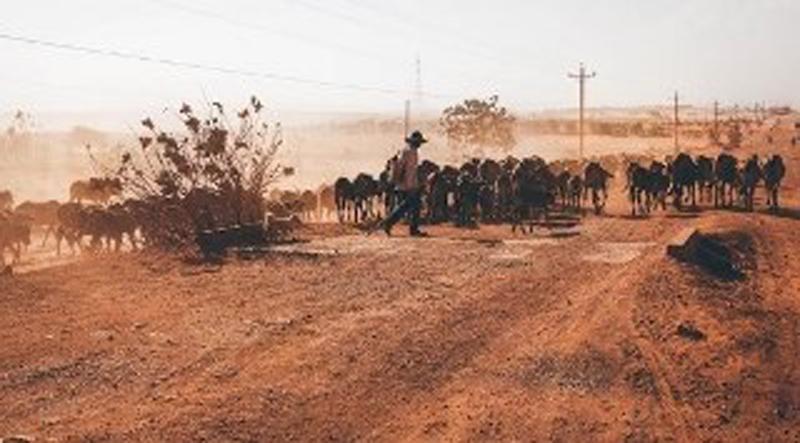
Au Niger, le projet PRISMA soutient une taskforce pour préserver l’élevage au Sahel
Halissa HASSAN DAN AZOUMI | 16/06/2025
Au Sahel, dans les pays comme le Mali, le Niger et le Burkina Faso, l’élevage est très important. Il fait vivre de nombreuses familles. Mais aujourd’hui, ce secteur est en danger. Les éleveurs manquent de terres pour faire paître leurs animaux. Les couloirs de passage sont fermés, les sols se dégradent, et les sécheresses sont plus fréquentes. Pour faire face à ces problèmes, des organisations d’éleveurs des trois pays ont décidé de s’unir. Avec l’aide dudu Projet de recherche et innovation pour des systèmes agro-pastoraux productifs, résilients et sains en Afrique de l’ouest (PRISMA), financé par l'Union européenne, elles ont créé un groupe commun : la Taskforce Pastorale. Ce groupe a un but : défendre les droits des éleveurs et améliorer leurs conditions de vie. Ensemble, ils ont choisi plusieurs priorités : Protéger les terres de pâturage, Lutter contre les maladies des animaux et les toxines, Trouver de bons aliments pour les troupeaux, Créer une assurance en cas de sécheresse. Grâce à cette union, les éleveurs peuvent mieux faire entendre leur voix et proposer des solutions adaptées. La Taskforce Pastorale veut continuer ce travail même après la fin du projet PRISMA, en cherchant son propre financement et en développant des partenariats. Les membres sont très motivés. Pour eux, cette alliance est une chance pour sauver l’élevage au Sahel.
-
Empowering Uganda’s educators through Competence Based Curriculum training.
Sharon IBENU | 12/06/2025
In 2020, the Ministry of Education and Sports (MoES) launched Uganda’s new Competency-Based Curriculum (CBC), setting the stage for a major transformation in the country’s education system. The CBC was designed to move away from the old model of memorizing facts, instead focusing on helping students develop practical skills, critical thinking, and the ability to apply what they learn in real life. Implementing a new curriculum is never as simple as it seems. To truly embrace the CBC, teachers need to not only understand its principles but also feel fully equipped to apply them effectively in their classrooms Recognizing this, Enabel in partnership with the Ministry of Education, has to date trained 1,050 teachers in the Busoga and Rwenzori regions of Uganda to strengthen their knowledge and delivery of the new Competency-Based Curriculum (CBC). The training, conducted under the WeLearn project, is structured around five core modules of preparing to teach, lesson delivery, assessment, action research and supporting out-of-class activities. By the end of the training, the teachers should be able to plan and deliver CBC lessons more effectively, have more practical strategies for engaging students, have the necessary tools to reflect on and improve their teaching practices, as well as highlight the importance of co-curricular and extra-curricular activities in holistic learner development. The impact of this training is already being felt. Silvia Namukasa, Agriculture teacher at Jinja senior secondary school shares, "Before this training, I often relied on traditional methods. Now, I feel empowered to make my lessons more interactive and relevant. My students are going to be more engaged, and I see them thinking critically and working together in ways I hadn’t seen before." This development is set to transform classrooms into more dynamic, engaging, and relevant spaces, that prepare learners for the demands of the 21st century. These reforms are not just policy changes, but they are reshaping the daily experiences of teachers and students across the country. They also represent a strategic investment in Uganda’s future, by laying the foundation for a generation of learners who are adaptable, innovative, and ready to succeed Ms. Biira Jetrida, a Mathematics and Physics teacher at St. Theresa Girls Secondary School-Nsenyi noted: "I have now learnt how to apply ICT tools into my lessons i.e. Canva, PowerPoint, paddlet. Previously I carried a lot of textbooks to class but with this training, I have been opened to new possibilities. I am excited to implement these new approaches and watch my learners grow in confidence and skill." Elizabeth Nkwasire, a teaching and learning expert at Enabel sums it up well, "We are witnessing a remarkable shift in how teachers approach their work. The enthusiasm and willingness to embrace new methods is inspiring, and it’s translating into more meaningful learning experiences for students. This is the kind of sustainable change we strive for."
-
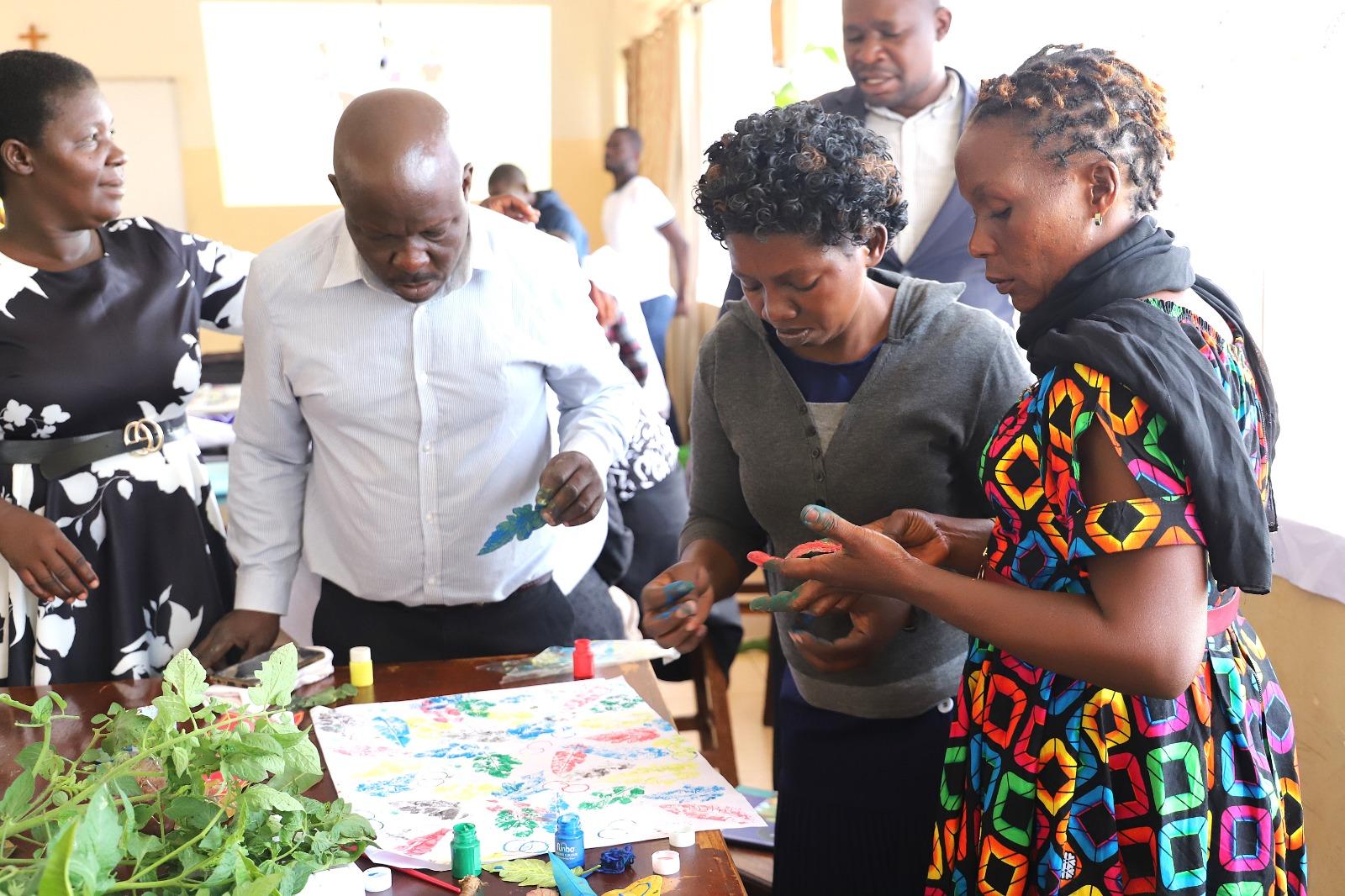
Making learning effective through low-cost materials in Uganda
Sharon IBENU | 12/06/2025
Schools in under-resourced communities face a challenge of lack of access to traditional teaching aids. Enabel, is tackling this challenge while training educators in the Competency-Based Curriculum (CBC) by highlighting that effective learning does not require expensive materials. Teachers across Busoga and Rwenzori regions of Uganda have been empowered to transform readily available resources such as; bottle tops, newspapers, plastic bottles, and other everyday items into valuable educational tools. This approach has enhanced accessibility and fostered creativity and adaptability among both teachers and students. Nabaigwa Norah, an ICT teacher at Buwenge Town Council Seed Secondary School, shares her experience: "When I first started using bottle tops and old magazines in my lessons, I was unsure how the students would respond. To my surprise, they became more curious and eager to participate. These materials make abstract concepts tangible, and students relate better because they see these items in their daily lives. It has truly transformed my teaching and their learning." The impact of this resourceful approach is increasingly evident in classrooms across Busoga and Rwenzori regions.Teachers report greater confidence in delivering CBC lessons, while students are more engaged and motivated. The use of familiar, everyday materials bridges the gap between home and school, fostering a sense of ownership and pride in the learning process. Mr. Longoire Richard, Art and Design teacher at St. Peters Senior Secondary Namwendwa, emphasizes the creative potential: "Art is about expression, and when students use recycled materials, they realize that creativity is not limited by resources. I have seen learners who were once shy become confident artists, simply because they could experiment without fear of wasting expensive supplies. This method has opened up new possibilities for both teaching and learning." Enabel’s commitment to practical, sustainable solutions is helping to ensure that the CBC is not just a policy on paper, but a lived reality in Ugandan schools. Through promoting the use of low-cost materials, Enabel is supporting teachers to unlock the full potential of every learner regardless of background or circumstance. Furthermore, the adoption of low-cost materials is cultivating a culture of innovation within schools. Teachers are now collaborating to share ideas and develop new teaching aids, creating a supportive network that benefits the entire education community. This spirit of innovation is enhancing classroom experiences and also equipping teachers with the skills to adapt to future challenges.Ms. Flavia Mpeirwe, Teaching and Learning Officer at Enabel, highlights the broader impact: "Low-cost materials are not just a solution to resource constraints; they are a catalyst for active learning. Through our trainings, teachers discover that effective teaching is possible with what is already around them. This empowers them to create engaging lessons and inspires learners to participate more fully. The transformation is visible in the energy and enthusiasm in classrooms." As Uganda continues to implement the CBC, the use of low-cost materials stands out as a practical and sustainable strategy. It ensures that no child is left behind due to lack of resources and nurtures a generation of learners who are creative, resourceful, and prepared to solve real-world problems. The success of this approach demonstrates that with ingenuity and commitment, quality education is attainable for all.
-
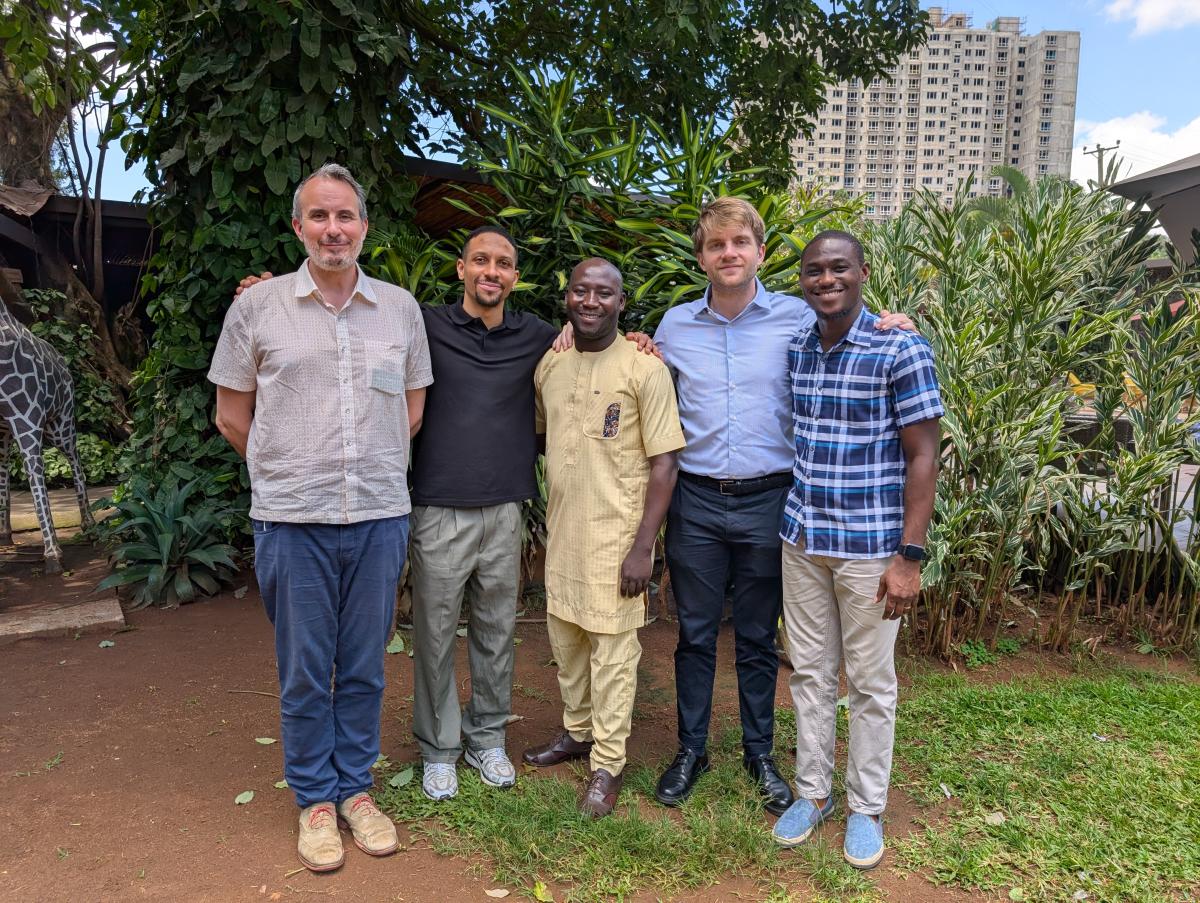
Digital innovations in Mali and Uganda empowering communities through health and agriculture
Alice BONJEAN | 10/06/2025
As part of the Wehubit 2.0 programme, Enabel Innovation Hub launched a Call for Proposals in December 2023 to catalyse digital social innovations in response to the accelerating digitalisation of our societies. The focus was on scaling novel, proven solutions with the potential for meaningful and wide-reaching impact. The Call prioritised disruptive innovations over incremental ones. This distinction was decided on factors such as risk, impact potential, and resource requirements. Ultimately, Wehubit sought innovations that not only address current challenges but also offer scalable, sustainable solutions, positioning Wehubit as a trusted partner throughout the innovation journey. Following a rigorous selection process, 2 projects were chosen to begin their scaling trajectory in August 2024. This process will last between 12 and 24 months, during which the projects will receive financial and technical supports from Enabel Innovation Hub team. This support goes beyond financial aid, encompassing guidance on learning, capacity-building workshops and networking opportunities through events involving other Innovation Hub-supported initiatives funded by Belgium and/or the European Union. Through this approach, Wehubit 2.0 aims to enhance the adoption and accessibility of digital solutions that foster inclusive and sustainable development, reduce inequalities, and empower people in Enabel’s partner countries. The 2 selected innovations are aligned with the strategic priorities of Enabel’s country portfolios and are ready to scale their impact.Meet the 2 winners supported by Enabel Innovation Hub 1. ALeDIA, Mali ALeDIA is a digital application designed to enhance child health in Mali. Implemented in health centres, it optimises the care of children under five by assisting health workers and improving the quality of care. The project aims to expand ALeDIA’s use, strengthen health workers’ skills, generate evidence of its impact, and support its large-scale deployment across Mali. This project is implemented by Terre des hommes (Tdh), a foundation established in 1960 and committed to improving the lives of children worldwide. With a focus on child health, justice, and migration, Tdh works to enhance access to quality care, especially for vulnerable populations in rural and semi-urban areas across Africa. The foundation’s work in childhood nutrition and healthcare aims to reduce preventable deaths and improve long-term health outcomes for children under five.2. Longa, Uganda and Mali Longa is a computer programme capable of understanding spoken Swahili and Luganda, helping farmers make their voices heard. Developed by Farm Radio International (FRI) in collaboration with the Consultative Group on International Agricultural Research (CGIAR), it transcribes, translates, and analyses voice messages from smallholder farmers.This enables FRI to better understand their needs and adapt its radio broadcasts accordingly. By expanding to other languages, Longa strengthens the autonomy of marginalised communities and improves communication between civic and policy stakeholders. This innovative tool enhances feedback mechanisms, promotes inclusivity, and contributes to a more food-secure future. This project is implemented by Farm Radio International, a Canadian non-profit organisation working with radio broadcasters to enhance food security and agricultural knowledge for small-scale farmers in African countries. By integrating innovation into its mission, FRI ensures that underserved communities receive vital information in their own languages.
-
RDC : Mobilisation pour l'éducation et la dignité menstruelles
Mandy BAKINE NGASHUE | 10/06/2025
À l'occasion de la Journée Internationale de l’Hygiène Menstruelle-28 mai 2025, un puissant élan a émergé en République Démocratique du Congo pour briser le silence autour des menstruations. Dans les provinces du Haut-Katanga, du Sud-Ubangi et du Kasaï-Oriental, des activités de sensibilisation ont été organisées pour rompre les tabous, promouvoir une éducation inclusive à la santé menstruelle et garantir la dignité de chaque fille et femme. Cette journée a rassemblé élèves, enseignants, parents, leaders communautaires et autorités locales dans un élan d'unité et d'action. Grâce au soutien des projets EduBase, menés avec l'appui d’Enabel et de ses partenaires, des initiatives marquantes ont vu le jour : des pièces de théâtre éducatives, la distribution de kits d’hygiène menstruelle durables, des ateliers sur la fabrication de serviettes hygiéniques réutilisables, et des formations pour créer un environnement scolaire informé et bienveillant. Les résultats sont probants : des milliers de jeunes sensibilisés, des parents mieux informés, des enseignants engagés, et des barrières culturelles qui commencent à tomber. Ces efforts conjoints libèrent la parole, changent les mentalités et ancrent un message fort : la menstruation ne doit plus être une source d'exclusion, mais une réalité intégrée dans la vie sociale, scolaire et communautaire. La promotion de l’hygiène menstruelle est un engagement continu, visant à permettre à chaque fille de vivre sa puberté avec sécurité et fierté, sans interruption de son parcours scolaire. À travers cette mobilisation, la RDC réaffirme son engagement pour l’égalité des genres, le droit à la santé et l’éducation pour tous.
-
Intégrer le genre pour mieux combattre le paludisme au Burundi
Jean BIRONKWA | 10/06/2025
Le paludisme demeure la première cause de morbidité et de mortalité au Burundi, avec un taux d’incidence de 399,1 pour 1.000 habitants, selon l’annuaire statistique 2023. Les femmes enceintes, les enfants de moins de cinq ans et les personnes en situation de vulnérabilité sont les plus touchés. Dans un contexte où le Burundi a réaffirmé à plusieurs reprises ses engagements internationaux en faveur de l’équité de genre notamment à travers l’adhésion aux Objectifs de Développement Durable, la Convention sur l’élimination de toutes les formes de discrimination à l’égard des femmes (CEDEF) ou encore les engagements de la Conférence Internationale sur la Population et le Développement, il est essentiel de traduire ces principes dans les politiques de santé.C’est dans cette optique que le Ministère de la Santé Publique et de la Lutte contre le Sida, à travers le Programme National Intégré de Lutte contre le Paludisme (PNILP), en collaboration avec Enabel via le projet Malariya Pi financé par la Fondation Gates, a initié une étude sur les déterminants de genre dans la lutte contre le paludisme. Réalisée dans les provinces de Kirundo et Cibitoke, l’étude met en lumière plusieurs obstacles : Une faible fréquentation des structures de soins par les hommes, limitant les effets des stratégies de prévention. Un pouvoir économique restreint des femmes, entravant leur accès aux soins. Une intégration encore marginale de la dimension genre dans les politiques et programmes de lutte contre le paludisme. L’atelier de restitution, à la fois participatif et mobilisateur, a permis de valider collectivement les recommandations. Tous les acteurs, les ministères, partenaires techniques, société civile se sont engagés à traduire les résultats de l’étude en actions concrètes pour renforcer l’inclusivité et l’efficacité de la réponse contre le paludisme au Burundi.
-
Catalyzing Change: Awa Prize Days Champion Women Entrepreneurs and Green Growth in Tanzania
Proscovia GREGORY | 10/06/2025
In May 2025, Tanzania became a focal point for celebrating and advancing women's entrepreneurship, particularly within the context of inclusive green growth. Enabel, the Belgian agency for development cooperation, spearheaded the Awa Prize Days across Kigoma and Dar es Salaam on the 14th and 16th. More than just events, these gatherings served as dynamic platforms connecting women entrepreneurs with government representatives, private sector leaders, international organizations, and development partners. The two-day program featured practical training, cross-sector dialogue, and peer learning—critical elements in strengthening a more inclusive and resilient ecosystem for women-led businesses, particularly those driving circular and green economic models.The significance of this initiative was highlighted by the presence of Fanny Heylen, Head of Cooperation at the Embassy of Belgium in Tanzania. Representing Belgian cooperation, she reaffirmed Belgium's dedication to gender equality and women's economic empowerment as crucial drivers of sustainable development. "Empowering women entrepreneurs is not only a matter of equity, but a smart investment in a more sustainable and resilient future," Ms. Heylen remarked, setting a collaborative and forward-looking tone for the discussions. The event strategically bridged grassroots capacity building with high-level policy dialogue. In Kigoma, the focus was intensely practical. Forty women entrepreneurs, part of the Awa Prize network and the Wezesha Binti project (Belgium’s initiative for adolescent girls and young women), took part in an intensive workshop aimed at strengthening their capacity with modern business strategies, tools, and skills essential for sustainable growth. Facilitated with support from the ILO, PASS Trust, and Her Initiative Tanzania, sessions covered digital tool adoption, business formalisation, labour law navigation, finance access, and local market engagement. Beyond the training, an exhibition allowed participants to showcase their products and, importantly, share their personal journeys, highlighting the resilience and innovation required to overcome barriers in the entrepreneurial landscape. “As a woman entrepreneur, balancing family care and business can be challenging", explained Zainab Seif Kabobo after the workshop. "Today, I have learned many new things, but I also realized that many actions I am already taking are leading me on the right path as an entrepreneur. Next time I attend this type of workshop, I would like to be the person who shares her good practices.” The conversation evolved in Dar es Salaam, shifting towards systemic change during a high-level networking event at the Coral Beach Hotel. A key panel, "Breaking Barriers, Building Futures," tackled the deep-rooted challenges women face in business. Leaders like Ms. Mwajuma Hamza (TWCC), Ms. Noreen Toroka (ILO), and Enabel's own Mr. Earnest Musinamwana, alongside AWA Prize winner Ms. Janet Kabugho (Uganda), debated crucial needs: better access to finance, gender-sensitive policies, and stronger cross-sector collaborations to help women scale their ventures. A second panel zeroed in on the future: "Women Entrepreneurs Leading the Way to Inclusive, Green, and Smart Cities." This session explored the vital role women play in driving innovation and sustainability, particularly within the circular economy. Experts like Ms. Sara Prima, Ms Nusura Myonga from Her Initiative, Mr Pius Matunge from Tengeneza Generation alongside AWA Prize winner Ms. Kathia Iradukunda (Burundi). The discussion showcased inspiring examples, from green startups to digital empowerment projects, reinforcing the necessity of nurturing inclusive innovation ecosystems where women and youth can lead community transformation. The Awa Prize Days initiative in Tanzania is a clear manifestation of Enabel's wider commitment to dismantling the structural and cultural obstacles hindering women's economic participation. By connecting local innovators and entrepreneurs through platforms like the Awa Prize and Wezesha Binti, Enabel actively links grassroots solutions to broader sustainable development goals. As Jovitha Mlay, Enabel Tanzania's Gender and Social Inclusion Expert, highlighted, Tanzanian women are already leading innovation; the critical need is for "sustained support, visibility, and access to opportunities." The Awa Prize Days represent a tangible step towards fulfilling that need, fostering a future where women entrepreneurs are central to Tanzania's inclusive and sustainable growth. “At the Awa Days, I learned many things. The most important element would be the power of networking. I will use this network to promote and sell my products in the future.” explained Sister Evangelista Chubwa.
-
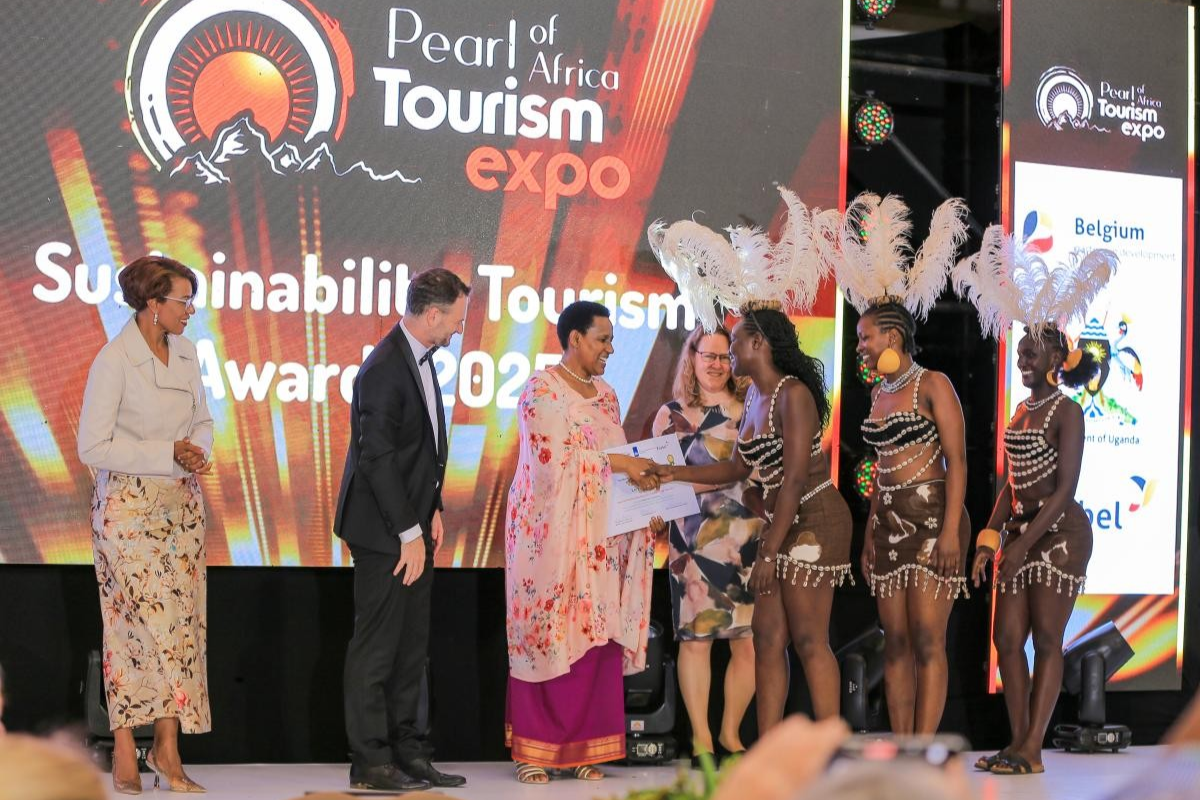
Stakeholders call for sustainable tourism at the 9th Pearl of Africa Tourism Expo in Uganda
John CANDIGA | 10/06/2025
The ninth edition of the Pearl of Africa Tourism Expo (POATE) from 21st to 24th May concluded at Speke Resort Munyonyo with a strong call to tourism operators and buyers to ensure that tourism uplifts communities, protects ecosystems, and delivers long-term value for future generations. POATE, Uganda’s annual tourism and travel trade show, was held under the theme “Tourism and Sustainable Transformation.” Organised by the Ministry of Tourism, Wildlife and Antiquities, the Uganda Tourism Board, and development partners, this year’s expo brought together more than 300 exhibitors and 3,000 delegates from over 50 countries. The event featured Business-to-Business and Business-to-Consumer interactions, providing networking opportunities for local and international tourism players. During the opening ceremony, Hon. Tom Butime, the Minister for Tourism, Wildlife and Antiquities, described POATE as a key platform for positioning Uganda as a top destination in Africa. ‘’POATE is more than just an event,” he said. “It is Uganda’s flagship tourism marketing platform, designed to connect local tourism businesses with international buyers, investors, and media. Over the years, it has grown into a regional brand, affirming Uganda’s position as a leading tourism destination in Africa.” As part of the event, Enabel in Uganda, in partnership with the Ministry of Tourism, Wildlife and Antiquities, and the Centre for the Promotion of Imports from developing countries (CBI), organised a Sustainability Tourism Awards Ceremony. The awards recognised eco-tourism champions and the early adapters of Fair Trade Tourism Certification. In her remarks at the Awards Ceremony, Doreen Katusiime, the Permanent Secretary at the Ministry of Tourism, Wildlife and Antiquities, reaffirmed the ministry’s commitment to sustainable tourism practices. She emphasized that sustainable tourism must be more than a catchphrase, but a guiding principle in both policy and practice. “We recognize that sustainability must go beyond individual action; it must be embedded in our policies, standards, and daily operations.” She noted that the Ministry is working with stakeholders to develop forward-thinking tourism policies, enforce certification and compliance frameworks, and support responsible investments. She also acknowledged the role of key partners, including Enabel in Uganda, CBI, and the Uganda Tourism Board, for being instrumental in creating opportunities for Ugandan tourism enterprises to align with global best practices. Tom Vanneste, the Country Director for Enabel in Uganda, said that Enabel is proud to be at the forefront of supporting Uganda's efforts to become the world's top sustainable tourism destination. He applauded the Ministry of Tourism, Wildlife, and Antiquities and the Uganda Tourism Board for driving this vision. “Together with the Uganda Tourism Board, we launched the Fair Trade Tourism certification,” he said. Tom added that the private sector actors, including lodges, hotels, and tour operators, can now register for certification and integrate key sustainability principles that boost both tourism businesses. (Fair Trade Tourism registration link: http://www.fairtradetourism.org/). Tour companies were recognised for their commitment to sustainable tourism during the awards ceremony. Sun Africa Expeditions and G&C Wild Tours/Frontiers were awarded for being early adopters of the Travelife partner certification, and Acholi Homestay was awarded for achieving the Fair Trade Tourism Engaged status. Additional awards went to Boomu Women’s Group for having the Most Sustainable Exhibition Stand under the Community groups category, and Kara-Tunga Tours received an award for the Most Sustainable Exhibition Stand under the Tourism Experience category.
-
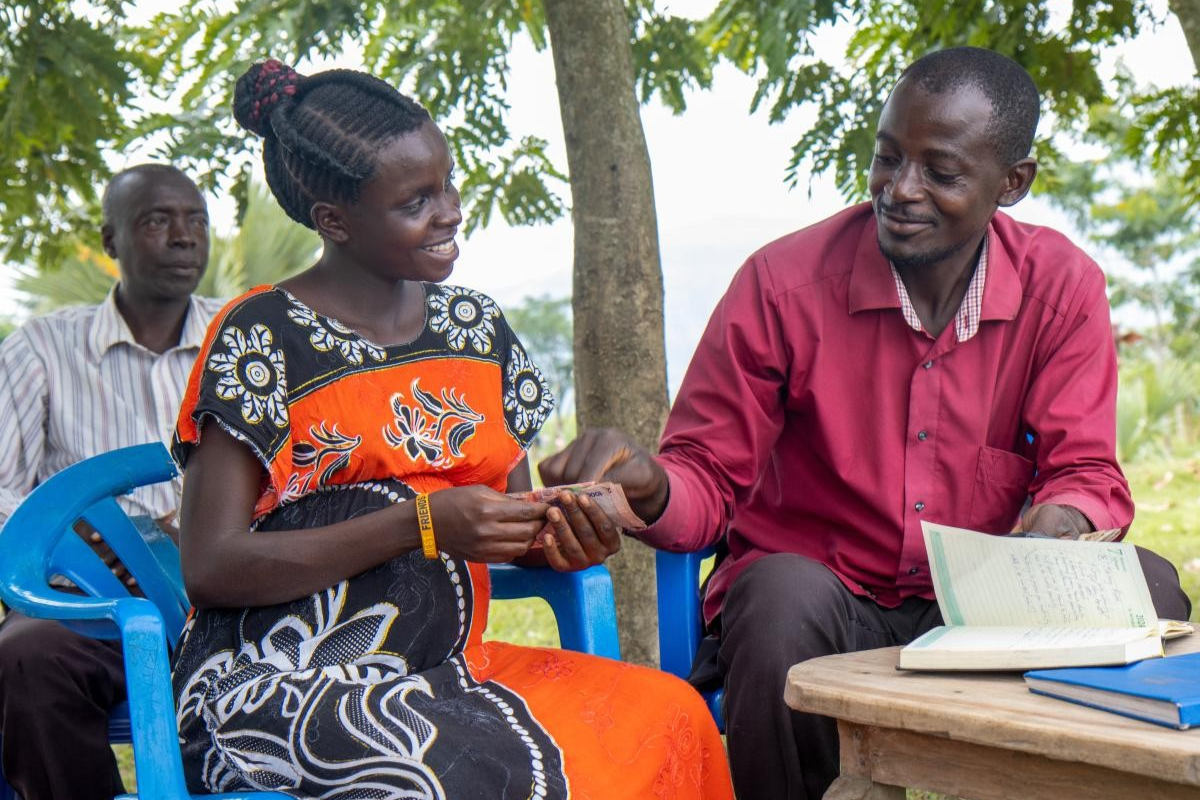
Village savings groups changing healthcare access in rural Uganda among expectant mothers.
John CANDIGA | 10/06/2025
With a due date drawing closer, Kajumba Joselyne in Bweramule Sub-County, Ntoroko district is preparing for one of the most significant moments of her life—giving birth. Unlike many other expectant mothers in her community who struggle to afford medical care, she has a plan. Through the Kyotuha Village Savings and Loans Association (VSLA), Joselyne has been diligently setting aside money every week, ensuring she can access quality healthcare when she needs it most. “I save between 1,000 to 2,000 Ugandan shillings every week”, she shares with determination. “Since I started, I haven’t needed to borrow yet, but I know that when the time comes for delivery, I will have the funds to get to a health center and receive proper care”, added Joselyne. For many expectant mothers in Ntoroko district, accessing maternal healthcare is challenging. With public health facilities often miles away and costly transport fares, some women are left with no choice but to seek help from Traditional Birth Attendants (TBAs), despite government restrictions on their services since 2010. Joselyne said that many women in the community walk long distances to public health centers for antenatal and other maternity services. However, when labor begins, they may not have the money needed for transport to health facilities or to afford services from private facilities, so they turn to Traditional Birth Attendants. Through Enabel’s Social Protection Project, Joselyne’s Village Savings and Loans Association group was among those selected for capacity-building training on financial management and saving for health promotion. The training equipped the group members with knowledge on managing their income and saving weekly for health to address the existing barriers to healthcare access in the community especially among expectant mothers. By promoting saving for health among the VLSA groups, community members are empowered to take control of their health by preparing for health emergencies. Kajumba Roselyne has now saved a total of 130,000 UGX for health. The Community Development Officer for Bweramule Sub-County, Biira Sylvia, said she has witnessed the impact of the health savings firsthand. “I visited one of the groups recently, and four expectant mothers had saved over 700,000 UGX. It’s inspiring to see women embracing this initiative, and preparing for health emergencies,” she said. With five months left until her due date, Joselyne remains hopeful. By the time she is ready to give birth, she expects to have saved at least 250,000 UGX—enough to cover transport to Bweramule Health Center III and purchase essentials for her newborn baby. While many expectant mothers in Uganda still face challenges in accessing proper medical care and timely maternity services, Joselyne is determined to change the narrative by being an active saving for health member. She is determined to ensure that when she welcomes her baby, she will be in the safe hands of a trained midwife.
-
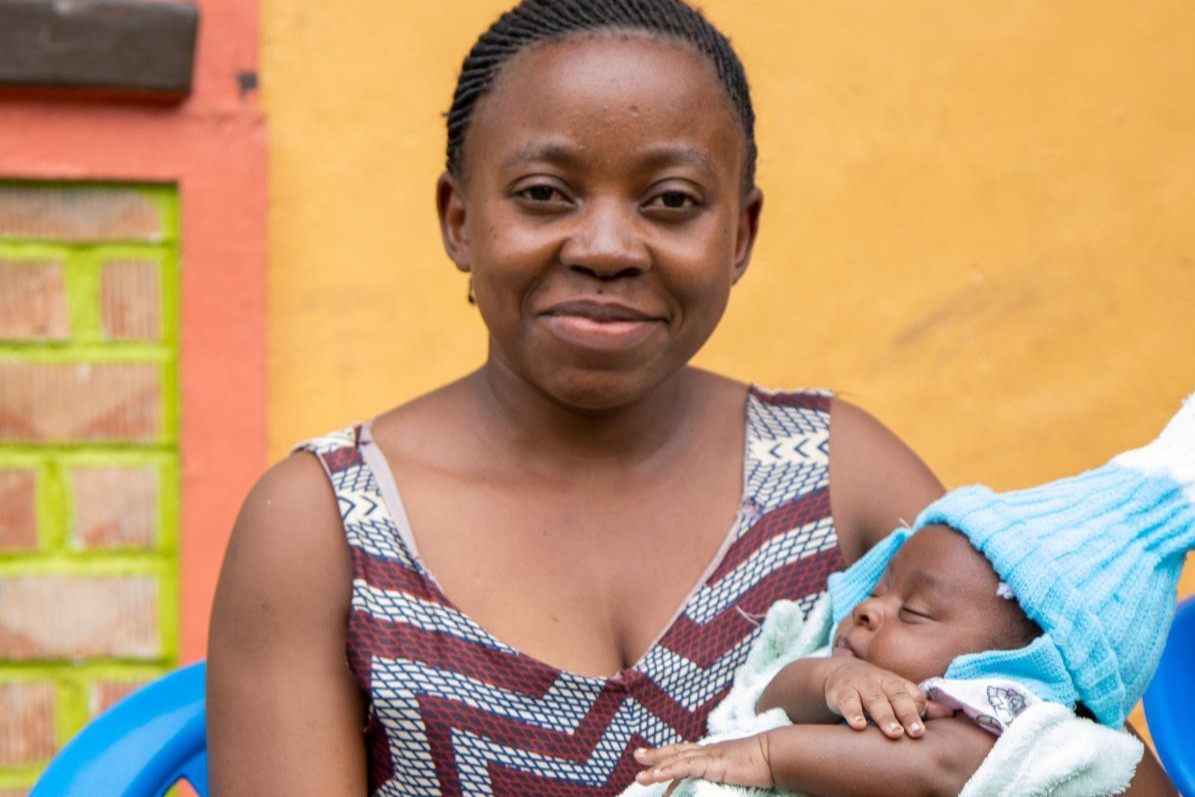
I plan to save more for my next pregnancy, says a mother in Ntoroko district, Uganda
John CANDIGA | 10/06/2025
Pregnancy is a journey that brings both immense joy and responsibility to women and their families. In Uganda, especially in rural areas, expectant mothers often face numerous challenges during this period due to limited access to healthcare facilities, lack of awareness about prenatal care, and socioeconomic factors. For Bagenyi Asnet, saving for health is what will make this journey less challenging. The 24-year-old is a member of the Basambo United Village Savings and Loans Association group, in Bweramule Sub-County, Ntoroko district. From the third month of her pregnancy, Asnet started saving for health to prepare for the birth of her baby. Bweramule Sub-County in Ntoroko district is one of the areas with inadequate, poorly equipped health facilities and a poor road network. This therefore meant that for residents to access quality medical services, they will have to incur high transport costs and sometimes buy medication from private facilities. This also motivated Asnet Bagenyi to join Saving for Health in December 2023. “Reaching the health facility is our greatest challenge here. Many women, who have not kept some money aside, have ended up delivering at home”, added Asnet. When Bagenyi Asnet gave birth in June this year, she had saved 80,000 UGX for health in her group, Basambo United. She borrowed 50,000 UGX from the group to fuel a hired car to transport her to Karungutu Health Center IV since her condition could not allow her to sit on a bodaboda. “My case became an emergency, and I was referred to Karugutu Health Center IV. Since there was no ambulance at Bweramule Health Center III, I had to fuel a hired car”, she added. Through the group chairperson, Bagenyi Asnet's saving for health loan was approved without delay since the chairperson, Baluku David, always advised them to contact the leadership during health emergencies. “We have a very quick and transparent borrowing mechanism for our saving for health members. Issues of health do not need delays, so in most cases, I encourage them to call if they can not come physically”, said the chairperson. Bagenyi operates a produce retail stall in Masindi trading center. She plans to fully settle her loan in the next month. Her saving for health plan is to continue saving for herself and her baby and to possibly increase her weekly savings premium. “It will help me one day, perhaps in my next pregnancy”, added the jolly, Bagenyi Asnet.
